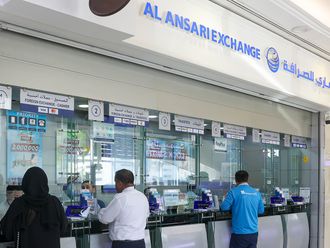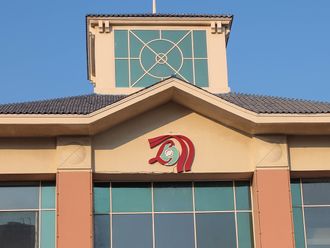Gold hit a ten-week low on Tuesday, as support from safe-haven demand diminishes on strong economic data out of Europe, but strong physical buying and tight supply in Asia are expected to provide a floor for prices.
The strong hold for gold prices would be around $1,320. This year's Lunar New Year falls on February 3. China, a key player in the region's gold market, kicks off a week-long holiday on February 2.
Holdings in the SPDR Gold Trust the world's largest gold-backed exchange-traded fund fell 10.926 tonnes, its biggest one-day loss since early October, to 1,260.843 tonnes by Jan 24. Spot silver fell to $26.64 an ounce, its lowest in nearly two months.
It was trading at $26.77, down half a percent. Holdings in the iShares Silver Trust gained 0.8 percent to 10,478.08 tonnes, off an 11-week low of 10,394.53 tonnes on Jan 21.
The euro rose near a two-month peak on Tuesday, showing only the barest signs of fatigue after a rally in the past two weeks, as climbing euro zone interest rates prompted speculators to bet on further gains in the currency.
The single currency last traded at $1.3665 having risen as high as $1.3685, just one pip off a two-month peak marked in New York on Monday. The move brings into play the next major resistance level, at $1.3742, a 61.8 percent retracement of the Nov-Jan fall, and then the euro's November 22 high of $1.3786.
Underpinning the single currency were growing expectations that the European Central Bank will lift interest rates ahead of the US Federal Reserve, after recent tough talk on keeping inflation in check by ECB chief Jean Claude Trichet.
In contrast, the Fed, more worried about creating jobs, is set to keep a cautious view on US economic recovery after its policy-setting meeting on Wednesday.
The dollar index dangled near a 2-½ month low of 77.814 hit on Monday. It last stood at 77.924, down 0.1 percent so far in Asia. The greenback was further hit by renewed risk appetite as Wall Street resumed its rally.
The Australian dollar fell broadly after lower-than-expected consumer inflation data reinforced market expectations that Australia's central bank will be in no hurry to lift interest rates. The yen did not move after the Bank of Japan kept its policy unchanged following its policy meeting ending on Tuesday, as expected.
India's central bank raised key interest rates on Tuesday by a quarter point each, as expected, in a bid to clamp down on resurgent inflation and warned that higher food prices could become entrenched if steps to boost output are not taken.
The increase in key rates was the seventh since March, and while the 25 basis point rises were expected, a growing number of analysts had said in recent days that a 50 basis point increase was needed. The Indian rupee strengthened on Tuesday, supported by the euro's gains against the dollar and firmer local stocks.
The central bank said on Monday inflation may stay high for longer than anticipated earlier due to a rise in global commodities prices and domestic supply side pressures that have recently pushed up food prices. Indian shares were trading up 0.4 percent on firm Asian peers. However, the main index is down more than 6 percent this month as foreign funds withdrew around $892 million.
US crude futures extended declines for a sixth day on Tuesday, weighed down by forecasts calling for a second straight week of builds in US crude supplies. Brent got an early boost when Saudi Oil Minister Ali al-Naimi, said he expected global oil demand to rise between 1.5 million and 1.8 million barrels per day in 2011 - more than forecast by the International Energy Agency.
Unseasonably cold weather is likely to grip northern Europe again from late February into spring, after a relatively mild spell in late January, Weather Services International said.
US Federal Reserve policymakers begin a two-day meeting on Tuesday and investors will be watchful over what they might decide to do with interest rates and efforts to stimulate the economy.
Sterling eased against the dollar on Monday, as traders took profits after the UK currency scaled two-month highs last week and on nagging doubts about whether Britain's interest rates are headed higher in coming months. Traders also pointed to a Daily Telegraph article which said the UK could be headed for stagflation and even small interest rate hikes could hurt.
Implied rates based on overnight indexed swaps have pared chances of a 25 basis point rate hike in May to 65 percent, from 70 percent late last week. GBP could come under renewed selling pressure if the minutes from the Bank of England's January rate meeting, due on Wednesday, turn out to be dovish.
Sterling has been well supported since higher-than-forecast UK inflation data this month caused investors to bring forward expectations for when the BoE will raise rates.
The first estimate of fourth-quarter gross domestic product will be released on Tuesday and analysts expect growth to have slowed as a harsh winter is likely to have hurt construction activity and the service sector.
Source: Richcomm Global Services DMCC, Dubai
|
Price Update
|
|
|
GOLD
|
1331.8
|
|
SILVER
|
26.72
|
|
EURO
|
1.3643
|
|
GBP
|
1.5966
|
|
YEN
|
82.46
|
|
RUPEE
|
45.54
|
|
AED / INR
|
12.398
|
|
AUD
|
0.996
|
|
CHF
|
0.9487
|
|
CAD
|
0.9921
|
|
OIL - WTI)
|
87.58
|
|
|
|
|
Date
|
January 25, 2011
|
|
Time
|
11:10:57 AM
|











